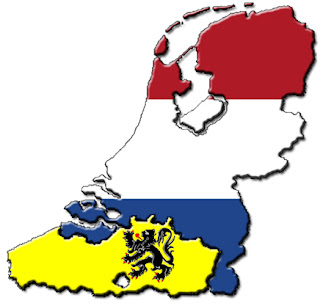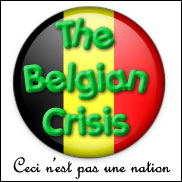After Belgium: Will Flanders and the Netherlands Reunite?
From the desk of Paul Belien on Thu, 2007-08-23 13:49

Belgium is rapidly unraveling. Following the June 10th Belgian general elections, won by Flemish-secessionist parties, the Belgian parties seem unable to form a government coalition.
Belgium is a multinational state, the model for the European Union’s efforts to turn Europe into a single multinational state. Belgium is made up of 60% Dutch-speaking, free-market oriented Flemings and 40% French-speaking, predominantly Socialist Walloons. The Belgian Constitution stipulates that the government should consist of 50% Flemings and 50% Walloons. Belgian governments always have to rely on a majority in both Flanders and Wallonia, since major decisions need the support of both parts of the country. In practice this means that 20% of the population (i.e. half of the Walloons) can veto every decision. This has made the Parti Socialiste (PS), the Walloon Socialist Party, the power broker in the country.
The refusal of the PS to reform the welfare state system has caused growing Flemish frustration, and turned what used to be a linguistic conflict into a dispute about economic and welfare policies. While Flanders pays most of Belgium’s taxes the bulk of the money flows to Wallonia. There a welfare-receiving electorate votes for parties which for over three decades have been blocking any attempts at reforming the collapsing welfare system.

Since the 1970s Flemish parties have radicalized, demanding larger autonomy over welfare issues. Apart from welfare reform the next Belgian government also has to reach an agreement over Brussels. The city, which is historically Dutch, is a bilingual enclave surrounded by the Halle-Vilvoorde district of the Flemish province of Brabant. At present Brussels-Halle-Vilvoorde (BHV) is one large, single electoral constituency. Flanders wants to assume full autonomy over Halle and Vilvoorde, and demands that these two Flemish towns and the surrounding Flemish villages are split off from bilingual Brussels. This is also being vetoed by the Walloon parties, although four years ago the Constitutional Court of Belgium, with 50% French-speaking judges, ruled that the present situation is unconstitutional and that BHV should be split by July 2007.
The Belgian politicians are unable to solve the BHV problem, and any new elections are unconstitutional as long as the BHV constituency has not been divided into one bilingual constituency Brussels and one Flemish constituency Halle-Vilvoorde. Politically Belgium is now in a catch-22 situation: The Belgian parties are unable to form a government because they cannot agree about splitting up BHV and new elections cannot be held as long as BHV has not been split up.
Last week, Prof. Em. Robert Senelle, one of Belgium’s most prominent constitutionalists, a Flemish Socialist and formerly a teacher of the Belgian Crown Prince, advised the Flemings to annul the Belgian Constitution and solemnly declare Flemish sovereignty. Following this advice Filip Dewinter, the leader of the secessionist Vlaams Belang party, the largest party in the Flemish Regional Parliament, called upon the Flemish Parliament to convene and declare Flanders an independent country.
Yesterday another Flemish constitutionalist, Prof. Paul Van Orshoven said that “intelligent people” should consider a Flemish secession from Belgium. “Because the situation cannot go on where a minority denies the majority its legitimate and democratic aspirations.” Prof. Van Orshoven said that if Flanders secedes this obviously violates the Belgian Constitution, which requires that the Walloons approve of such a decision. He referred, however, to the historical precedent of the Tennis Court Oath. The Tennis Court Oath refers to 20 June 1789, when the representatives of France’s third estate [the bourgeoisie] declared themselves to be the true representatives of the nation. “In the spirit of the Tennis Court Oath it is permitted that, even if it violates the Belgian constitutional rules, a simple majority of the Dutch-speakers in the Belgian Chamber of Representatives and the Senate declare to secede.”
Apart from the media in Belgium and the neighbouring Netherlands, the international papers and broadcasters have hardly reported about the disintegration of the EU’s host country. On Tuesday a survey of the Dutch [Netherlandish] television network RTL4 showed that 77% of the inhabitants of the Netherlands are in favour of the Netherlands and Flanders merging into one country.
In Belgium, an internet poll of Flanders’ largest newspaper, Het Laatste Nieuws, showed 50.9% in favour of reuniting Flanders and the Netherlands. The Flemish provinces were part of the Netherlands until 1831, when the international powers established the Kingdom of Belgium.
Anyone interested in the background to what is happening in Belgium, and the repercussions this could have for the EU, would do well to read my book “A Throne in Brussels.”
EU: The Model is Collapsing. Brussels Calls upon King for Help, 18 August 2007
Flanders and France Vote for the Right. But Flanders Will Not Get What It Is Entitled To, 11 June 2007
McKinsey CEO Calls for End of Belgium, Resigns, 13 December 2005
The Dark Roots of the EU, 5 December 2005


Dutch response
Submitted by Amsterdamsky on Sat, 2007-08-25 08:45.
"it would be interesting to hear the opinion of Dutch people on proposed marriage"
I can't speak for the natives but I am sure they don't want your Antwerp muslims.
Regarding any new union the Catholic/Protestant wars are over. Belgium is certainly the most liberal Catholic country in the world.
Sameness (please correct me if I am wrong)
1) Gay marriage is legal in both Netherlands and Belgium
2) Netherlands and Flanders have a common language
3) I would argue both are trending market oriented policies
4) There is no enforced border
I would just warn Flemings that want to join the Netherlands that the Dutch government is far more incompetant and bloated and useless than it appears. You would probably be better off with your own government.
Brussels hole?
Submitted by Emigrantus on Fri, 2007-08-24 01:52.
Where did you guys get that picture next to the article? The reason I'm asking: what's that hole doing there in the place where Brussels should be? And where is Voeren?
Heretz Dietsland
Submitted by peter vanderheyden on Fri, 2007-08-24 15:28.
"Where did you guys get that picture next to the article? The reason I'm asking: what's that hole doing there in the place where Brussels should be? And where is Voeren?"
Yes, and shouldn't Duinkerke be included? And the German East Frisia? And on the coasts of Wales we had some Flemish settlements too. It's historically flamish! Let's grab it!
Flanders will hold it over their head, but it won't happen
Submitted by Flemish American on Thu, 2007-08-23 18:22.
I've always sympathized with the Flemish point of view, but I've never been an advocator of Belgium splitting up. Although it is a young nation in number of years, the cultures of the different Belgian province are so intertwined that splitting it up would be long and painful.
There have been some who would liken a separation of Flanders and Wallonia to the creation of the Slovak and Czech Republics from the old Czechoslavakia. They are näive. Those nations did not have an issue like Brussels on hand as the Slovaks were more than happy to reclaim Bratislava as their capital and made no claims to Prague.
As far as the current efforts to create a government, I can understand the Flemish frustration, but the structure of the Belgian government was created to ensure that both language groups were given equal voice in major decisions, something like the American Senate, where the size of the state makes no difference and each one gets two senators. Of course, since the U.S. has 50 states, this does not create the same quagmire we see in in Belgium right now, but the principle is essentially the same.
One thing I would be interested to know, and I'm sure there is some intelligent people here who can help me with this, "Was there ever a time during the period when the Walloons had more influence that the Flemish side essentially blocked off the forming of the government?". We can learn a lot from history.
Lord, grant me the strength to change the things I can;
the serenity to deal with the things I cannot change;
and the wisdom to know the difference.
Union with the Netherlands
Submitted by Jason on Thu, 2007-08-23 18:13.
Other than linguistic considerations, why would a free Flanders want a union with the Netherlands?
@Jason
Submitted by Cogito on Thu, 2007-08-23 22:10.
Because Flanders IS a part of the Netherlands, historically. Read the last sentence of the article.
@Cogito
Submitted by Jason on Thu, 2007-08-23 23:03.
Yeah I'm well aware of that, but then that's not really an answer is it? Flanders was also historically part of Austria, Spain, France, Burgundy, and the Roman Empire. In fact, Flanders was only part of the Netherlands for 16 years; it was part of Revolutionary France for 20.
The point being, just because certain states of affairs existed in the past is not a sufficent reason for them to be returned to that state.
My question is, assuming Flanders declares its independence, why would its people choose to relinquish it so quickly and be annexed by their northern neighbors? Would that really be in their best interest?
@ Jason. Re: Flanders and the Netherlands
Submitted by Paul Belien on Fri, 2007-08-24 18:59.
The Flemish provinces are the historic southern provinces of the Netherlands. They have always been part of the Netherlands. They were the most important part of the Netherlands until 1585, when Spanish troops conquered the South. The young people who made this video [in English] know this and so do we.
The Flemish provinces were reunited with the Northern Netherlands from 1814 until 1830/31. As soon as Belgium ceases to exist they will be able to join the North again, because, as the Antwerp poet Theodoor van Rijswijck wrote, "Hier en aan de overkant, daar en hier is Nederland." (Here and at the other side, there and here is the Netherlands)
Re: Flanders and the Netherlands Vol II
Submitted by missingmyumlauts on Sat, 2007-08-25 01:57.
Poetry and your emotions notwithstanding, it would be interesting to hear the opinion of Dutch people on proposed marriage. And when I say Dutch, I mean majority of citizens and not just some romantic wing.
I thought that historically speaking "... reunion of the two regions was not a happy one, for they had become widely disparate in political background, tradition, religion, language, and economy. In 1830 the Belgians revolted and established their independence as a sovereign state. A conference in London of the major European powers formulated the conditions of separation in 1831. The stipulations were accepted by the Dutch king under pressure from France and Great Britain. But when they were later revised by the conference in favor of the Belgians, a Dutch army invaded Belgium and routed the opposing forces. The conditions of separation were again revised and were finally accepted by both countries in 1839."
What makes you think this (re)union will work better second time around?
Re: Belgium
Submitted by missingmyumlauts on Thu, 2007-08-23 15:47.
So Mr.Belien, who and what is then stopping Flanders going forward, declaring independence and forming the goverment in the mould of i.e. Slovenia or Croatia? EU would not be in position to apply its double standards, as key member states strongly supported independence of breakaway Yugoslavian republics in the early 90's.
If people and political elites of Flanders are in agreement (this is my conclusion from your postings) King and Walloons have a slim chance preventing the collapse of current political model.
Or could it be maybe that Flemish community is well aware that breakaway would help regain control over Halle-Vilvoorde area, but newly independent Flemish state would face a long and uncertain battle in its quest to reclaim City of Brussels municipality (given the current demographic structure)?
I look forward to your answer. Thanks in advance.